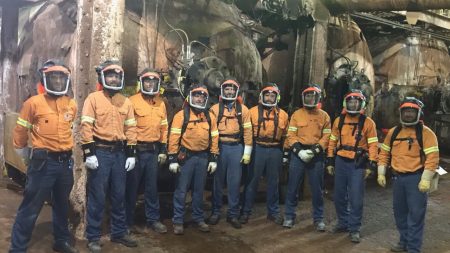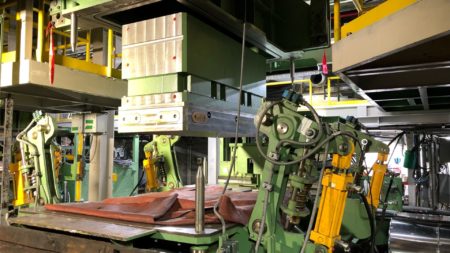Making Emergency Stops a Thing of the Past

Pictured is the maintenance team responsible for the autoclave lining reliability project: Jean-Philippe Jomphe, Simon Harvey, Dany Kirouack, Alexandre Martel, David Poirier, Patrice Grégoire, Yannick Bilodeau, Marc-Olivier Nadeau and Mario Boily.
At Vaudreuil Works, autoclaves are used as part of the Bayer process for separating alumina from bauxite. Until recently, the autoclave linings required expensive ongoing maintenance, but this has changed now that the Quebec Operations Asset Management teams have taken over the maintenance work.
In January 2019, the maintenance team worked together to find a solution. “We approached suppliers for theoretical and practical training that would allow us to update our knowledge of the equipment,” explained Yannick Bilodeau, Mechanical Technician, West Hydrate. “We were then able to standardise the operation and review the maintenance schedules.”
“In terms of material costs, this initiative has resulted in savings of $85,000 in autoclave linings,” said Mario Boily, Maintenance Planner, Asset Management. “Beyond that, there are the benefits associated with increased equipment availability for the operation, which amounts to another $85,000 a year. This improvement therefore represents $170,000 in recurring annual savings. Before we made these changes to our processes, we had to replace up to three per week, and this task often called for extra time and extra staff.”
Additionally, emergency stops have become a thing of the past for the maintenance team in this sector. The implementation of best practices has reduced the number of interventions by about 900 staff-hours per year. “Despite the increase in production demand, we are able to determine when to stop an autoclave,” said Gilles Fradette, Superintendent, Hydrate West. “This is a significant improvement and, above all, a major time saver.”
Without question, the biggest improvement in this whole process has to do with workers’ quality of life and safety. Simon Harvey, Industrial Mechanic, addressed this aspect: “Working on the autoclaves is physically demanding and involves long hours. Now that this maintenance work is being taken care of, we can focus on value-added tasks and use our energy more efficiently.”
Employees were able to improve the entire process, thanks to their diligence and their close adherence to the new procedures. This is yet another example of how delegating responsibility and taking the time to review work processes can make all the difference to a team’s well-being and performance.


